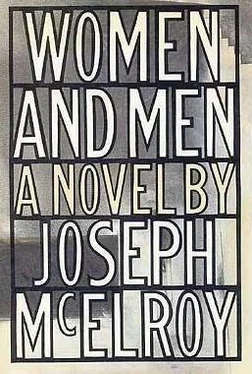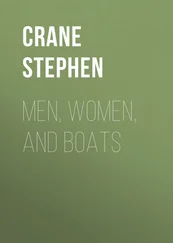We had learned we were a language; or was it we’d been asked to be? For questions came our way at such speed they were only implicit, such as Wie gehts? full of such problems as the uses that that language had been put to during the War, so for our part we would right out up front respond, "Say la question." We had been told or had learned we were perhaps words; or we were of all things the collision course along which larger matters tracked; or we were the "all" that proved Part to be oft greater than Whole; or if not "all," then we were the "us" {in we) so buried that we could but bear with it, for then at least if it came to light, so would we, though if not broken now and again toward parcels of life seen by bent parts of light that from another system seemed straight we when we are most turning seem, multiple by multiple, most dark as if by an anti-light.
Sometimes we imagined we didn’t know who we were, and this was sometimes in turn because when told we were angels (or, as "file ‘em"-type category, "ange l " as in "vegetable" or "mineral") it came as an accusatory interrogation painfully circular could be so don’t take her serially. Yet from different direction came dual charge (1) that Light, which had theretofore been not understood, was totally devoid of rest and the energy that goes with rest (thus all up front and restless), and (2) that all the time that we didn’t know it, Light was Us (or, speech-patterned the way the late century in question sometimes couched information, What if "Light is Us?).
That there ran threads in us of Light who could question? not even an interrogator in a sequondam language-quoia whose pay don’ go as far this month because of inflation in your tight-money Chicago-school pocket-pool export reinvestment system. But when both women and men took to seeing their own trademarked thread of illumination outside themselves in Others and at the instant when they themselves (qua selves and, more deeply, quoia) felt the loss of these light threads, and, feeling this, then felt, lo! the threads of light return! (return like parents we had no less than off sprung!), . . why then a faith spread among us and evoked its supporting arguments like those ancient preliterate metal clays from which life after the fact claims to have arisen (like a smell) — and this faith threatened to prove that these threads were our collected and collectible brain. Needless to add, faith’s threatening argument relied on such jumps as dreams are laid on and such acts as belong to, say, terminal segments of their own tail that certain earth-red once-purely-Chilean lizards will jettison when stalked by the sky-blue hypnosnake of the Andes whose attention (eye and tongue in terms of snake-minutes of attention) is so drawn to these independently twitching links of lost tail that the lizard for its part makes its getaway so long as it never looks back, in our opinion. And by acts of jump such as the above, or, better said, without such acts, why should we have supposed it would be in the end a literal bomb, when it came right out of our own restless Light: a burst responding to a passing intimacy of our own contrary matter, which is almost like love except with no time to admit there’s hardly time. Only the gates that light turns to and into, dark gates the obstacles Light finds and leaves in memory which is also obstacle and gate.
We think now that we knew the why for all these things once upon a time at the beginning but then the things ensued and the reason got left. At the starting gate? asks the interrogator with his idiomatic pedantry from the next room knowing no more about the future than we except fingering his well-wired (solid-state import) Persuasion Button which inclines us to give not a double answer to one question yet neither one to two — but. . one to one, that’s it! Yet we’ve got such a staff working on this we can forget responsibility almost, there’s such a wealth of history and we are making it, and by all continually processing ourselves into one we are transcending the old outmoded individual responsibility thus not passing buck but saving it. We wanted to tell our friends that we were pregnant.
O.K., I got the point: I am only the second person you’ve told these things to. So who was the first, if it wasn’t your wife? (It’s good you had some practice!)
A journalist named Mayga Rojas Rodriguez.
The one who died, the Chilean.
I don’t know that she was mainly a journalist. She lobbied for liberal politics back home and she had some big friends who weren’t friends, and she didn’t talk about all that.
You cared about her. But go on, what kind of settlements were they? They sound quite real, routine like they’re based on mature technology.
I wouldn’t know. Yes, I guess so.
Maybe not planned out with all these sophisticated alternatives we can think about now, but when you were fourteen or fifteen the agriculture and the torus-shell stress stuff wasn’t even in Galaxy I bet.
I wouldn’t know.
I know.
I simply saw a giant silver doughnut with spokes.
You keep saying you don’t know, Jimmy. But thirteen, fourteen? that was when these daydreams began.
Who knows where they came from.
I couldn’t care less about that; but what kind of settlements were these Earth-Moon stations?
My father would say, Don’t say "kind of."
To you?
I recall him saying it to my mother, too. I mean, he was harmless, he had a weekly quota of discomfort he had to absorb from us, from my mother’s irony and so forth. But he would say, Don’t even say the noun kind by itself, because it’s always more than you honestly mean.
Now, torus shape you said.
I didn’t know the name then.
It’s been arrived-at as the best shape for the space stations. I mean mathematically. And it gives you horizons and it gives you the option of building up from small units which are more fun, instead of macro—
I don’t know if that’s true of toruses alone.
I’m sure you don’t. Your mind sneaks out, Jim.
In 1945 I didn’t know any math. I had a geometry teacher who stood up in front of the board and looked like he had lost his next-to-last friend. He used to go in to New York to the opera and would tell us about it when he walked into class in the morning with gray-green moons under his eyes.
So the doughnut came from your mother’s kitchen.
God no — it might as well have come from my wife’s.
Joy didn’t do much cooking?
No, she did it all. All except doughnuts, but that’s asking a lot. And I never asked her.
You wouldn’t dream of it.
Homemade doughnuts were out of fashion. Pop-up waffles were what validated Flick and Andrew’s Weltanschauung hold the italics. But you were making a point. I got it. But of course Joy and I talked about dreams. Like any other couple.
You are funny.
Apparently, with you.
But you can’t kid me: you didn’t dream.
Didn’t read books either, to speak of.
But you did.
You make me say funny things.
So the truth comes out: you and Joy swapped dreams, and you did dream, all those years.
Not in the least. These were dreams that all came via her.
You make her sound like they didn’t come all from her.
It’s where they get to that matters.
Aren’t you a smug old thinker, really.
Now, you’re sounding like a slinky vulnerable intellectual lady I met actually in Bloomsbury when I was writing a piece on English breakthroughs in waste-disposal.
I can see why your marriage didn’t last.
No, I don’t think you can.
Читать дальше












